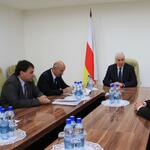Presidential elections in Georgia have not brought sensations. The new head of state, as predicted almost all, has become the candidate of the ruling coalition "Georgian Dream", uninviting and uncharismatic George Margvelashvili. There was not a second round, his nearest rivals- the candidate of the former ruling party "United National Movement" David Bakradze and former Speaker of the Parliament Nino Burjanadze, together scored less than a third of votes.
But this is not so important. Since these elections, the presidential post in Georgia will be more symbolic than practical. In accordance with the amendments to the Constitution, adopted three years ago, the president's powers are greatly reduced, redistributed between the parliament and the government (controlled by the same "Georgian Dream "). Saakashvili`s era has become irrevocably a thing of the past.
The elections were not an arena for the struggle of ideologies. The top three candidates for the presidency demonstrated touching unanimity on the main directions of foreign policy. President-elect Margvelashvili, as well as Bakradze and Burjanadze, support Georgia's accession to NATO and the EU, rejecting the possibility of returning the country in the CIS ("Georgia is clearly moving in the direction of Europe ") and dreaming of "the restoration of the territorial integrity of Georgia," that means, the return of the independent states South Ossetia and Abkhazia that is, of course, impossible.
There is no doubt that the Georgian course "from Russia" and Euro-Atlantic integration will not change. It is also absurd to expect improvement of Russian-Georgian, Georgian- Ossetian and Georgian- Abkhazian relations, the evidence of which is a number of actions against the installation of barbed wire along the Georgian -South Ossetian border, collecting signatures for a petition against Georgia's participation in the Olympic Winter Games in Sochi ( since the beginning of October has already been collected 28,000 ), burning Russian flags and other such tricks, demonstrating the true approach of Tbilisi to establish inter-state relations.
A striking finishing touch is the reaction of the Georgian leadership to the participation of the Russian pilot Ivan Nechayev, who among other warriors repelled the Georgian aggression in August 2008, in the Olympic torch relay. "The government, which intends to improve relations with the neighboring country, should not behave so provocatively," - commented on the fact the offended government of Georgia. The problem for Tbilisi, as well as in recent years, is not in unleashing the war against South Ossetia, but only in the response of Russia to this inhumane action.
And «to establish relations», apparently, is fundamentally important not for Georgia, which has damaged them itself, but just for Russia.
And this is despite the fact that the Russian market, contrary to the interests of the consumer and the foreign policy objectives of the Russian Federation, has opened for the Georgian wine and mineral water "Borjomi " (which, frankly speaking, loses Russian mineral water both in quality and price ). What other unilateral concessions are required from the Russian side? ... But in Tbilisi are not ready to accept the reality. Georgian political circles still do not even realize such an obvious thing that the train of the "confederate Georgia" is off, and the order of the day is not the "return" of South Ossetia and Abkhazia, which will never happen, but the preservation of the territorial unity that yet remained. Not accidentally Margvelashvili, Bakradze and Burjanadze, as previously Saakashvili with Ivanishvili, during the pre-election campaign in various ways were singing an old song about «finding a common language with Abkhazians and Ossetians» and the construction of new Georgia," which will be interesting for both Abkhazians and Ossetians."
In the current circumstances, the personal composition of the Georgian leadership is not so important - it is still unable to cope with the challenges of the time. In Georgia in the foreseeable future there will be neither pro-Russian, nor pro-Georgian politicians, realizing the depth of the internal and external risks facing the state. For qualitative improvement of the Russian-Georgian relations it is absurd the claims against Russia, but the repentance of the Georgian leadership (and, more importantly, of the society) for the events of 2008 (or rather, for what was happening at least since 1989). But Georgia is proud of its "heroes." The country obviously needs external governance, and it is necessary to carry out the old methods - by a Russian governor-general from the Vorontsov Palace, situated on Rustaveli Avenue in Tbilisi.

